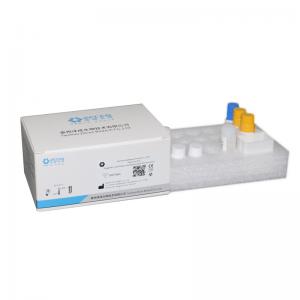
Add to Cart
CLIA Reagents of Inflammation (HA)
【Expected usage】
This product is used to quantitatively detect the content of hyaluronic acid (HA) in human serum in vitro.
Hyaluronic acid (HA) is a linear polymer polysaccharide composed of glucuronic acid and N-acetylglucosamine disaccharide units as monomers. Physiological function of receptor action to play its important role. HA molecules are synthesized by interstitial cells in various tissues, enter the blood through lymphatic pathways, and are taken up and degraded by liver endothelial cells. Elevated HA in blood.
Especially in judging the severity of liver disease, identifying the presence or absence of liver cirrhosis and predicting its development trend, HA is a good serological indicator. Among the early indicators reflecting liver fibrosis during the transformation of chronic liver disease to cirrhosis, HA has the best diagnostic value.
The diagnosis of liver fibrosis has always depended on the pathological diagnosis of liver biopsy, which has many obvious deficiencies, such as trauma, difficulty in repeated biopsy, and certain complications (1/3 of patients have pain; 0.3% of Serious complications in patients including hemorrhage, pneumothorax, colon and gallbladder perforation; and 0.03% mortality), non-uniformity of lesions within the liver, intra- and inter-observer variability, insufficient specimen length (length <20mm and <10 portal areas) are prone to underestimation and specimen fragmentation and subcapsular fibrosis can cause artifacts. For many years, people have been trying to find non-invasive serological indicators to evaluate liver fibrosis in chronic liver disease, including routine biochemistry, fibrosis, cytokines, immune function, etc., but so far, no single indicator can be sensitive enough and accurate enough reflect the degree of liver fibrosis.
According to the survey, liver cirrhosis occupies the sixth leading cause of death in the world. At present, there are 120 million hepatitis B virus carriers in my country, and about 35 million chronic hepatitis B patients. Together with chronic hepatitis C, fatty liver, schistosomiasis, immune liver disease, etc. Large potential patient population with liver fibrosis. Liver fibrosis is an inevitable stage in the development of liver cirrhosis. Liver injury caused by various factors can be secondary to liver fibrosis and then develop into liver cirrhosis. Early detection and active treatment of liver fibrosis, to reverse or delay its development, play a very important role in improving the quality of life of patients and improving the prognosis of patients.
There are many serological indicators for liver fibrosis detection. At present, the combined detection of hyaluronic acid, laminin, type III procollagen N-terminal peptide and type IV collagen is used to diagnose liver fibrosis. Among them, HA is also known as "small liver penetration", and the measurement has the following functions: 1. It reflects the formation of liver fibrosis; 2. It reflects the degree of liver fibrosis; 3. It reflects the function of liver cells; 4. It reflects the inflammatory lesions of the liver; It is an asymptomatic viral infection or severe viral infection, alcoholic liver disease, and biliary cirrhosis. As far as the current clinical research is concerned: HA is the most sensitive and specific index (more than 80%) among many fibrosis biochemical indicators.
HA is a good serological indicator for judging the severity of liver disease, identifying the presence or absence of liver cirrhosis and predicting its development trend; at the same time, HA is also the most valuable indicator of liver fibrosis in the early reflection of the transformation process of chronic liver disease to liver cirrhosis.
At present, the four domestically recognized indicators, namely HA, LN, PIIINP, and CIV, have a sensitivity of 60-70% and a specificity of over 90% for the diagnosis of liver fibrosis. Therefore, it provides a convenient and quick monitoring method for early clinical diagnosis and early treatment of patients.
Hyaluronic acid is currently measured in clinical and laboratory methods including enzyme-linked immunosorbent assay, colloidal gold method, fluorescence immunoassay, and chemiluminescence method.
| Test Item | HA |
| Luminescent Principle | Enzymatic chemiluminescence |
| Luminescent Markers | AP(alkaline phosphatase) |
| Specification | 100 Test/Kit for CIA series |
| / | |
| Principle | Sandwich method |
| Component | Magnetic Beads |
| Calibrator Low | |
| Calibrator High | |
| Anti-A/Anti-B | |
| Control 1 | |
| Control 2 | |
| Accessories Required But Not Provided | Substrate |
| Washing solution | |
| Sample material | Serum |
| Storage | 2-8℃ |





